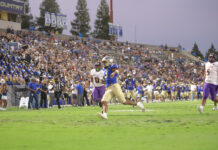
Constable Charles Henry Clifford (1864-1924) and his sisters arrived here in 1894. Charles and his sisters purchased 40 acres of land west of Fowler Avenue between Barstow and Shaw. They planted Muscat and Malaga vines.
Clifford would serve as constable from 1896 to 1924. He was a handsome man who would kneel at church with his holster and gun strapped to his waist. As constable, he would patrol on horseback, surrey, and, eventually, by auto.
According to Clovis historian Arthur Chedister, Constable Clifford was involved with a situation at a minstrel show. A minstrel show came to town and pitched a tent on a vacant lot on Clovis Avenue, just north of the John Good Store. Four brothers from Tennessee were present, and one was drunk. This drunk brother assaulted the wife of the minstrel manager, and the manager shot the man.
Constable Clifford arrested the wounded man. His wife and was transporting them by surrey to the Fresno County jail when the three brothers of the assaulter pursued Clifford on bicycles. Each brother had a Winchester rifle slung across their handlebars. While Clifford had two of the fastest horses from the Ingmire Livery stable, it is believed that the brothers overtook Constable Clifford. But, the three men on bikes did not see Clifford turn down Olive Ave, and they proceeded to turn on Ventura Ave. All of the brothers were arrested and safely jailed, but it is believed that they were acquitted. The injured man survived but lost his leg up to the top of his knee.
A new challenge for Constable Clifford occurred when the City of Clovis was incorporated on Feb. 27, 1912, as a “dry” city. It became unlawful to manufacture, sell, barter, furnish, deliver, exchange, or give away any spirituous, vinous, malt, mixed, fermented, distilled, alcoholic, or intoxicating liquor in Clovis. A barrel of wine was received at Clovis Depot, and it was decided to leave the barrel on a platform. The plan was to have Constable Clifford arrest the party or parties that claimed the barrel. After days of surveillance, though, the barrel was removed, and it was discovered that someone had siphoned the wine from underneath the platform.
A similar embarrassment occurred when wine was confiscated and stored at City Hall, which was located at the rear of the First National Bank on the southwest corner of Fifth and Pollasky. The confiscated wine disappeared on the day of the hearing and the suit was dismissed for lack of evidence.
Clifford was involved in other areas of Clovis. He would serve six years, from 1899 to 1905, as a school trustee in the Jefferson District. His two daughters were school teachers. Lula taught in Fresno, and Hazel was principal at Wolter’s School. Constable Clifford’s son Luther, after serving in WW I, worked with his father on the family farm.
Three of Clifford’s sisters, Martha, Hannah, and Minnie, operated a boarding house on the south side of Fourth Street, west of the R. E. L. Good store. It boasted the best food and lodging in town.
Constable Clifford had a younger brother, Vinton, who worked on the grain ranch of Jacob Cole, the uncle of Clovis Cole. At a point in his life, Vinton was employed by Fresno Flume and Irrigation for ten years. He was successful in buying and trading ranches. Vinton became known as a successful viticulturist who specialized in improving the vine industry. He was also employed by the Supervisorial District No. 2 and built bridges and oiling roads. And, he served as a Trustee at Jefferson Union school from 1911-1919.
The Clifford family is part of our rich heritage.









